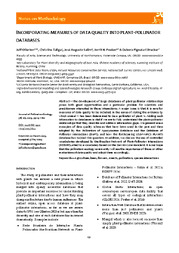Incorporating measures of data quality into plant-pollinator databases.
Incorporating measures of data quality into plant-pollinator databases.
Autoria: OLLERTON, J.; TALIGA, C.; SALIM, J. A.; POELEN, J. H.; DRUCKER, D. P.
Resumo: The development of large databases of plant-pollinator relationships poses both great opportunities and a particular problem for scientists and practitioners interested in these interactions. A major issue is that it is rare for measures of data quality to be included, in the sense of stating the evidence by which animal X has been determined to be a pollinator of plant Y. Adding such information to databases is vital if we are to fully understand the plant-pollinator relationships that they describe and address information gaps. We present some examples of data quality schemas that have been used in the past and then adopted by the Pollinators of Apocynaceae Database and the Database of Pollinator Interactions (DoPI), and how the forthcoming USDA-NRCS PLANTS database has tackled this question. In addition, we discuss the use of controlled vocabularies developed by the Brazilian Network of Plant-Pollinator Interactions (REBIPP), allied to a vocabulary based on the Darwin Core standard. It is our hope that the pollination ecology community will see the importance of these or other evaluations of data quality and adopt them accordingly.
Ano de publicação: 2025
Tipo de publicação: Artigo de periódico
Unidade: Embrapa Agricultura Digital
Palavras-chave: Abelha, Agricultura, Agriculture, Apocynaceae, Base de Dados, Data quality, Databases, Flor, Flowers, Insects, Inseto, Interação entre espécies, Polinização, Pollination, Qualidade de dados, Species interactions
Observações
1 - Por padrão são exibidas publicações dos últimos 20 anos. Para encontrar publicações mais antigas, configure o filtro ano de publicação, colocando o ano a partir do qual você deseja encontrar publicações. O filtro está na coluna da esquerda na busca acima.
2 - Para ler algumas publicações da Embrapa (apenas as que estão em formato ePub), é necessário ter, no celular ou computador, um desses softwares gratuitos. Sistemas Android: Google Play Livros; IOS: iBooks; Windows e Linux: software Calibre.
Acesse outras publicações
Acesse a Base de Dados da Pesquisa Agropecuária (BDPA) para consultar o acervo completo das bibliotecas da Embrapa.

